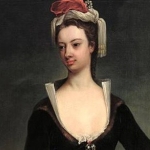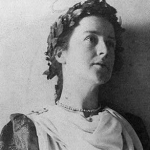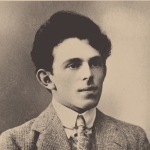Januarie. Ægloga prima. ARGVMENT.
IN this fyrst Æglogue Colin clout a shepheardes boy complaineth him of his vnfortunate loue, being but newly (as semeth) enamoured of a countrie lasse called Rosalinde: with which strong affection being very sore traueled, he compareth his carefull case to the sadde season of the yeare, to the frostie ground, to the frosen trees, and to his owne winterbeaten flocke. And lastlye, fynding himselfe robbed of all former pleasaunce and delights, hee breaketh his Pipe in peeces, and casteth him selfe to the ground.
COLIN Cloute.
A Shepeheards boye (no better doe him call)
when Winters wastful spight was almost spent,
All in a sunneshine day, as did befall,
Led forth his flock, that had been long ypent.
So faynt they woxe, and feeble in the folde,
That now vnnethes their feete could them vphold.
All as the Sheepe, such was the shepeheards looke,
For pale and wanne he was, (alas the while,)
May seeme he lovd, or els some care he tooke:
Well couth he tune his pipe, and frame his stile.
Tho to a hill his faynting flocke he ledde,
And thus him playnd, the while his shepe there fedde.
Ye gods of loue, that pitie louers payne,
(if any gods the paine of louers pitie:)
Looke from aboue, where you in ioyes remaine,
And bowe your eares vnto my doleful dittie.
And Pan thou shepheards god, that once didst loue,
Pitie the paines, that thou thy selfe didst proue.
Thou barrein ground, whome winters wrath hath wasted,
Art made a myrrhour, to behold my plight:
Whilome thy fresh spring flowrd, and after hasted
Thy sommer prowde with Daffadillies dight.
And now is come thy wynters stormy state,
Thy mantle mard, wherein thou mas-kedst late.
Such rage as winters, reigneth in my heart,
My life bloud friesing wtih vnkindly cold:
Such stormy stoures do breede my balefull smarte,
As if my yeare were wast, and woxen old.
And yet alas, but now my spring begonne,
And yet alas, yt is already donne.
You naked trees, whose shady leaves are lost,
Wherein the byrds were wont to build their bowre:
And now are clothd with mosse and hoary frost,
Instede of bloosmes, wherwith your buds did flowre:
I see your teares, that from your boughes doe raine,
Whose drops in drery ysicles remaine.
All so my lustfull leafe is drye and sere,
My timely buds with wayling all are wasted:
The blossome, which my braunch of youth did beare,
With breathed sighes is blowne away, & blasted,
And from mine eyes the drizling teares descend,
As on your boughes the ysicles depend.
Thou feeble flocke, whose fleece is rough and rent,
Whose knees are weak through fast and evill fare:
Mayst witnesse well by thy ill gouernement,
Thy maysters mind is ouercome with care.
Thou weak, I wanne: thou leabe, I quite forlorne:
With mourning pyne I, you with pyning mourne.
A thousand sithes I curse that carefull hower,
Wherein I longd the neighbour towne to see:
And eke tenne thousand sithes I blesse the stoure,
Wherein I sawe so fayre a sight, as shee.
Yet all for naught: snch [such] sight hath bred my bane.
Ah God, that loue should breede both ioy and payne.
It is not Hobbinol, wherefore I plaine,
Albee my loue he seeke with dayly suit:
His clownish gifts and curtsies I disdaine,
His kiddes, his cracknelles, and his early fruit.
Ah foolish Hobbinol, thy gyfts bene vayne:
Colin them gives to Rosalind againe.
I loue thilke lasse, (alas why doe I loue?)
And am forlorne, (alas why am I lorne?)
Shee deignes not my good will, but doth reproue,
And of my rurall musick holdeth scorne.
Shepheards deuise she hateth as the snake,
And laughes the songes, that Colin Clout doth make.
Wherefore my pype, albee rude Pan thou please,
Yet for thou pleasest not, where most I would:
And thou vnlucky Muse, that wontst to ease
My musing mynd, yet canst not, when thou should:
Both pype and Muse, shall sore the while abye.
So broke his oaten pype, and downe dyd lye.
By that, the welked Phoebus gan availe,
His weary waine, and nowe the frosty night
Her mantle black through heauen gan overhaile.
Which seene, the pensife boy halfe in despight
Arose, and homeward drove his sonned sheepe,
Whose hanging heads did seeme his carefull case to weepe.

















Comment form: